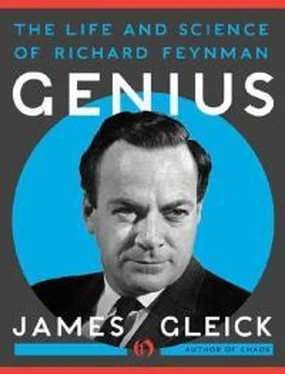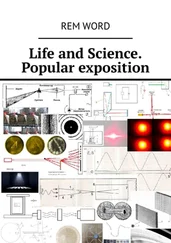If I said that magnets attract as if they were connected with rubber bands, I would be cheating you, because they’re not connected with rubber bands… . If you were curious enough you’d ask me why rubber bands tend to pul back together again, and I would end up explaining that in terms of electrical forces—
which are the very things I was using the rubber bands to explain, so I have cheated very badly, you see.
So I am not going to be able to give you an answer to why magnets attract. Except to tel you that they do
… I real y can’t do a good job—any job—of explaining the electromagnetic force in terms of something you’re more familiar with, because I don’t understand it in terms of anything else that you’re more familiar with.
He sat back and grinned.
To the professionals Feynman’s musings were not philosophy but a charmingly naive folk wisdom. He was both after and ahead of his time. Academic epistemology was stil wrestling with unknowability. What choice did they have, in light of scientific relativity and uncertainty, the abandonment of strict causality and the pervasiveness of ever-qualified probabilities? No more certainties, no more absolutes. The Harvard philosopher W. V. Quine mused, “I think that for scientific or philosophical purposes the best we can do is give up the notion of knowledge as a bad job… .” Not knowing had its ironies as wel as its pleasures.
For philosophers this was “the post-scholastic era,” as a later physicist, John Ziman, put it, “when it seemed essential to (dis)prove the peculiar (un)reality of scientific knowledge (theories/facts/data/hypotheses) by analysing (deconstructing) the arguments on which it was (supposedly) based.” Scientists themselves, in the knowledge business, had no use for this mode of discourse. Judged by results, their understanding of nature seemed richer and more efficacious than ever, the quantum paradoxes notwithstanding. They had rescued knowledge from uncertainty after al . “The scientist has a lot of experience with ignorance and doubt and uncertainty,”
Feynman said. “… we take it for granted that it is perfectly consistent to be unsure—that it is possible to live and not know. But I don’t know whether everyone realizes that this is true.”
Feynman’s gift to his coworkers was a credo, accreted
over time and disbursed both formal y and informal y, in lectures and books like the 1965 Character of Physical Law and in a stance, an attitude, that seemed too natural to constitute a philosophy.
He believed in the primacy of doubt, not as a blemish upon our ability to know but as the essence of knowing. The alternative to uncertainty is authority, against which science had fought for centuries. “Great value of a satisfactory philosophy of ignorance,” he jotted on a sheet of notepaper one day. “… teach how doubt is not to be feared but welcomed.”
He believed that science and religion are natural adversaries. Einstein said, “Science without religion is lame; religion without science is blind.” Feynman found this style of accommodation to be intolerable. He repudiated the conventional God: “the kind of a personal God, characteristic of Western religions, to whom you pray and who has something to do with creating the universe and guiding you in morals.” Some theologians had retreated from the conception of God as a kind of superperson—
Father and King—wil ful, white-haired, and male. Any God who might take an interest in human affairs was too anthropomorphic for Feynman—implausible in the less and less human-centered universe discovered by science.
Many scientists agreed, but his views were so rarely expressed that in 1959 a local television station, KNXT, felt obliged to suppress an interview in which he declared: It doesn’t seem to me that this fantastical y
marvelous universe, this tremendous range of time and space and different kinds of animals, and al the different planets, and al these atoms with al their motions, and so on, al this complicated thing can merely be a stage so that God can watch human beings struggle for good and evil—which is the view that religion has. The stage is too big for the drama.
Religion meant superstition: reincarnation, miracles, virgin birth. It replaced ignorance and doubt with certainty and faith; Feynman was happy to embrace ignorance and doubt.
No scientist liked the God of Sunday school stories or the “God of the gaps”—the last-resort explanation for the unexplainable, cal ed on through the ages to fil holes in current knowledge. Those who did turn to faith as a supplement to science preferred grander and less literal gods: “the ground of al that is,” as John Polkinghorne, a high-energy physicist turned Anglican priest, said: “Those who are seeking understanding through and through—a natural instinct for the scientist—are seeking God, whether they name him or not.” Their God did not fil gaps in the sense of particular lacunae for evolutionary theory or astrophysics—how did the universe begin?—but hovered over whole domains of knowledge: ethics, aesthetics, metaphysics. Feynman conceded the existence of genuine knowledge outside the range of science. He admitted that there were questions science could not answer, but grudgingly: he saw a danger in tying moral guidance to
unpalatable myths, as religion did, and he resented the common view that science, with its merciless unraveling and explaining, was an enemy of the emotional appreciation of beauty. “Poets say science takes away from the beauty of the stars—mere globs of gas atoms,” he wrote in a famous footnote.
I too can see the stars on a desert night, and feel them. But do I see less or more? The vastness of the heavens stretches my imagination—stuck on this carousel my little eye can catch one-mil ion-year-old light. A vast pattern—of which I am a part… . What is the pattern, or the meaning, or the why? It does not do harm to the mystery to know a little about it. For far more marvelous is the truth than any artists of the past imagined it. Why do the poets of the present not speak of it? What men are poets who can speak of Jupiter if he were a man, but if he is an immense spinning sphere of methane and ammonia must be silent?
He believed, too, in an independence of moral belief from any particular theory of the machinery of the universe. An ethical system that depended on faith in a watchful or vengeful God was unnecessarily fragile, prone to col apse when doubt began to undermine faith.
He believed that it was not certainty but freedom from certainty that empowered people to make judgments about right and wrong: knowing that they could never be more than provisional y right, but able to act nonetheless. Only by
understanding uncertainty could people learn how to evaluate the many kinds of false knowledge that bombard them: claims of mind reading and spoon bending, belief in flying saucers bearing alien visitors. Science can never disprove such claims, any more than it can disprove God. It can only devise experiments and explore alternative explanations until it gains a commonsense sureness. “I have argued flying saucers with lots of people,” Feynman once said. “I was interested in this: they keep arguing that it is possible. And that’s true. It is possible. They do not appreciate that the problem is not to demonstrate whether it’s possible or not but whether it’s going on or not.”
How could one evaluate miracle cures or astrological forecasts or telekinetic victories at the roulette wheel? By subjecting them to the scientific method. Look for people who recovered from leukemia without having prayed. Place sheets of glass between the psychic and the roulette table.
“If it’s not a miracle,” he said, “the scientific method wil destroy it.” It was essential to understand coincidence and probability. It was noteworthy that flying-saucer lore involved a considerably greater variety of saucer than of creature:
Читать дальше












